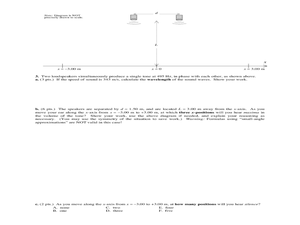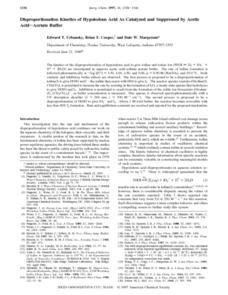Curated OER
Physics Midterm Exam #3 - Electromagnetic Radiation
True-false and multiple-choice questions are posed in Part A of this exam, covering the topic of electromagnetic radiation. In Part B, problems relating to refraction must be solved. This is a well-rounded exam that will help you...
Curated OER
Take-Home Midterm Exam #3, Part A
Let your physics learners take this electromagnetic radiation exam home to show what they know. You could also use it in class or assign it as a review. The content covers concepts pertaining to color, wavelength, frequency,...
NASA
The Atmospheric Filter
What is the difference between a comet and a meteoroid? An educational lesson includes five demonstrations of how the atmosphere can inhibit our ability to measure many things in the galaxy.
Curated OER
Organic Chemistry II Review Questions
In this chemistry worksheet, students determine the order of reactivity toward displacement in each of the series listed. Then they respond to several multiple choice questions as they relate to compounds and solutions. Students also...
Curated OER
Summary of Organic Reaction Mechanisms Needed for AS Chemistry
Advanced chemistry courses typically cover organic reactions. On this reference sheet, the five types of organic reaction mechanisms are explained and an example is shown. For each, there is also a diagram of the chemical reaction...
Curated OER
More Basic Biotechnology Tools, Sorting & Copying DNA
You can use these slides to explain the many complicated steps of the Polymerase chain reaction. The diagnostic and forensic uses of gel electrophoresis are detailed. This PowerPoint could be used to communicate facts, and also to...
Curated OER
Linkages Between Surface Temperature and Tropospheric Ozone
Students use data microsets of mean near-surface air temperature and tropospheric ozone residual averages to infer patterns. Students analyze changes in tropospheric ozone and then hypothesize about the consequences of these changes.
Curated OER
Kinetics of Acid
For this chemistry worksheet, learners examine the given concept in order to apply in the laboratory setting. The sheet includes in depth background information.
Curated OER
Ozone Hole - Changes in the Stratosphere
Halting the depletion of the hole in the ozone layer has been one of humanity's happy recoveries from previous damage done to the environment. Meteorology masters muse the Montreal Protocol and examine data on changes in the ozone....
Curated OER
Making a Surface Coating
Students prepare a nonaqueous surface coating by first making a polymeric resin and then adding an organic solvent. There product is a basic varnish that hardens by loss of organic solvent to the air. Students make a simple paint by...
National Institute of Open Schooling
Radioactive Pollution
Radioactive pollutants can enter the body through ingestion, inhalation, absorption, or injection. The last lesson in a series of 36 introduces pupils to radioactive pollution. They study its sources, both natural and man-made, its...
National Nanotechnology Infrastructure Network
Synthesis and Characterization of CdSe Quantum Dots
Does the size of a sample change the physical properties of that substance? It turns out it can! Young scientists combine physics and chemistry to synthesize CdSe quantum dots and record their color properties. Learners should...
Curated OER
A Bioluminescent Gallery
Students examine the different types of luminescence in deep sea organisms. In this bioluminescence lesson, students investigate how color and light aide deep ocean organisms by describing the characteristics of the habitat and...
Curated OER
Is Your Blue Really Blue? [Metamerism]
Students learn fundamentals about color perception, and explain the phenomenon called "metamerism". Students learn the three basic components of color perception: light source, illuminated colored object, and the light detector.
Curated OER
The Effects of Ultra-Violet Light on Yeast
Students work in small groups collecting and analyzing data as they learn how to best grow yeast. This activity allows students to conduct several student-created experiments as they continually generate questions and hypotheses. ...
Curated OER
Is It Hot in the Light?
Third graders make observations about the temperature of items in direct sunlight. In groups, they discuss why asphalt, brick and cement are warmer than items surrounding them. To end the lesson, they examine how heat transfers energy...
Curated OER
Science Summaries are the Bomb!
Fifth graders read a dissection article and complete close reading activities for the text. In this reading skills lesson, 5th graders read an interactive frog dissection article in teams. Student teams complete a KWL chart and...
Curated OER
Simple Organic Compounds
In this organic compounds activity, students read about the development of chlorofluorocarbons and the breakdown of this compound in the atmosphere. Students complete 2 short answer questions.
Curated OER
What happens to water before we use it?
Students examine how water is treated prior to becoming available for human consumption. In this water treatment instructional activity, students conduct an experiment in which they filter water. Students formulate a hypothesis, test,...
Curated OER
Control of the Cell Cycle
In this cell cycle worksheet, students review how enzymes control the cell cycle and what happens when the cell cycle becomes uncontrolled. This worksheet has 7 short answer questions.
University of Texas
Multi-wavelength Astronomy
Explore a land far, far away with a well-designed lesson that examines electromagnetic imaging as a way to obtain information about galactic structures. Learners begin to see the importance of looking beyond the visual spectrum to...
Curated OER
Shrinky Dinks® Palettes
Here is a fun and clever lesson for teaching physics classes how to calculate wavelength if given the energy and frequency data. On a worksheet, they compute wavelengths using a table of information that you provide. On a paper palette,...
Curated OER
Using Vegetation, Precipitation, and Surface Temperature to Study Climate Zones
Using NASA's Live Access Server, earth scientists compare the temperature, precipitation, and normalized difference vegetation index for four different locations. They use the data to identify the climate zone of each location using...
Curated OER
Ozone Tag
Seventh graders explain the role of stratospheric ozone and predict at least three ways in which depleted ozone would change her/his lifestyle. They then describe the process by which chlorine or bromine compounds can break down ozone...













![Is Your Blue Really Blue? [Metamerism] Lesson Plan Is Your Blue Really Blue? [Metamerism] Lesson Plan](http://content.lessonplanet.com/resources/thumbnails/94747/large/bwluav9tywdpy2symde4mtixny0zmdywos1smnd6dxauanbn.jpg?1545052463)









